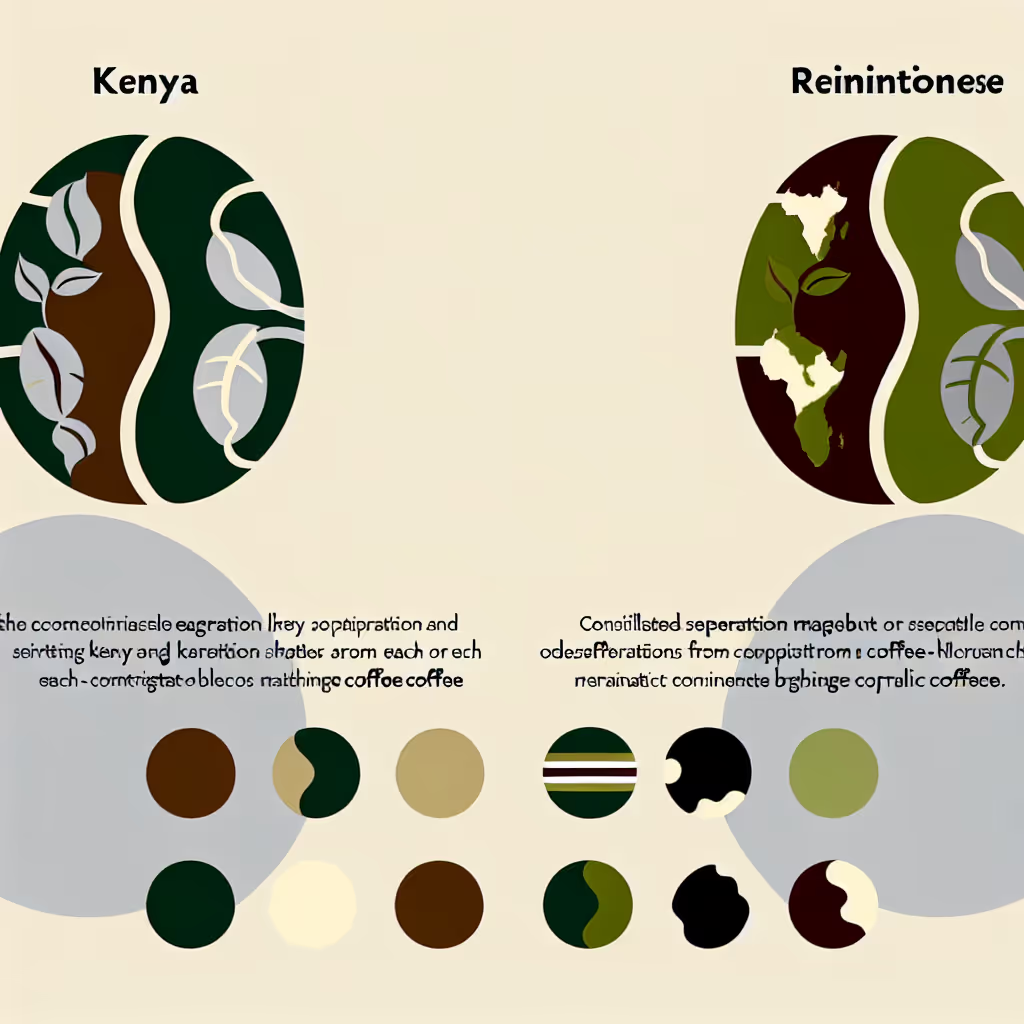Kenyan Vs. Angolan Coffee
This comparison explores the unique qualities of Kenyan and Angolan coffee, highlighting their distinct flavor profiles, growing conditions, and cultural significance in the world of specialty coffee.

Brief Description
Kenyan coffee is renowned for its bright acidity, full body, and complex flavor profile. Grown in the rich volcanic soils of the Central Highlands, these beans benefit from ideal climate conditions and meticulous processing. The result is a cup that's bold, wine-like, and often described as the 'connoisseur's choice'. With notes ranging from blackcurrant to citrus, Kenyan coffee offers a truly unique and memorable tasting experience.
Angolan coffee, once a powerhouse in the global market, is making a comeback after years of civil war. Known for its rich history and unique terroir, Angolan coffee offers a blend of earthy robusta and fruity arabica flavors. The country's diverse microclimates and traditional farming methods contribute to a coffee with distinct character, often featuring notes of chocolate, nuts, and subtle fruitiness. As Angola rebuilds its coffee industry, it's becoming an exciting origin for coffee enthusiasts seeking new and rediscovered flavors.
Importance of Comparison
Comparing Kenyan and Angolan coffee is crucial for coffee enthusiasts seeking to expand their palate and understand the diverse flavors Africa offers. These two origins represent different coffee traditions and terroirs, providing insight into how geography, climate, and processing methods influence taste. By exploring these contrasts, consumers can make informed decisions about their coffee preferences and appreciate the rich tapestry of African coffee production.
Key Attributes
Origin
Kenyan
Angolan


Consumer Guide
When choosing between Kenyan and Angolan coffee, consider your flavor preferences. If you enjoy bright, acidic coffees with complex fruit notes, Kenyan coffee might be your best choice. Look for descriptors like 'blackcurrant' or 'citrus' on Kenyan coffee labels. For those who prefer a more balanced cup with chocolate and nutty undertones, Angolan coffee could be ideal. Pay attention to the brewing method: Kenyan coffee shines in pour-over and French press, while Angolan varieties work well in espresso. Consider the roast level too; Kenyan coffees are often light to medium roast to preserve their unique acidity, while Angolan beans may be found in medium to dark roasts. Lastly, think about supporting coffee industries; choosing Angolan coffee can contribute to the country's rebuilding efforts in the coffee sector.
Expert Opinions
Coffee expert Maria Rodriguez notes, 'Kenyan coffee is often considered the pinnacle of brightness and complexity in the coffee world. Its unique processing methods, including double fermentation, contribute to its distinctive flavor.' On Angolan coffee, master roaster John Smith comments, 'Angola's re-emergence in the coffee scene is exciting. The combination of robusta and arabica varieties offers a unique flavor profile that's both familiar and exotic.' Both experts agree that these origins represent the diversity of African coffee, with Kenya showcasing high-altitude, acidic profiles and Angola offering a glimpse into a recovering coffee tradition with potential for growth.
FAQs
Kenyan coffee is known for its bright acidity, full body, and complex flavor profile with notes of blackcurrant, citrus, and floral undertones. Angolan coffee, on the other hand, offers a blend of earthy robusta and fruity arabica flavors, often featuring notes of chocolate, nuts, and subtle fruitiness. Kenyan coffee is generally more vibrant and wine-like, while Angolan coffee tends to be more balanced and mellow.
Kenyan coffee is typically grown at higher altitudes, ranging from 1400 to 2100 meters, in the rich volcanic soils of the Central Highlands. This high-altitude environment contributes to the coffee's bright acidity and complex flavors. Angolan coffee is grown at slightly lower altitudes, generally between 1000 to 1800 meters, in diverse microclimates. The country's varied geography allows for a range of flavor profiles in its coffee production.
For Kenyan coffee, pour-over, French press, and cold brew methods are highly recommended to highlight its bright acidity and complex flavors. These methods allow for better control over extraction, preserving the coffee's unique characteristics. Angolan coffee is versatile and works well with French press, espresso, and cold brew methods. The French press can enhance its chocolatey and nutty notes, while espresso can bring out its rich, balanced flavors.
Kenya has a significantly larger annual coffee production compared to Angola. Kenya produces approximately 50,000 metric tons of coffee annually, while Angola's production is around 8,000 metric tons. This difference reflects Kenya's established position in the global coffee market and Angola's ongoing efforts to rebuild its coffee industry after years of civil war.
Kenyan coffee is typically processed using the washed method, often with a unique double fermentation process, followed by sun-drying. This contributes to its clean, bright flavor profile. Angolan coffee processing methods are more diverse, including washed, natural, and semi-washed processes. This variety in processing contributes to the range of flavors found in Angolan coffee, from clean and bright to more fruity and complex.
Kenya has a long-standing reputation for producing high-quality coffee, with established systems for grading and auctioning. This history has solidified its position as a premium coffee origin. Angola, once a major coffee producer, saw its industry decline due to civil war. The country is now working to revitalize its coffee sector, drawing on its historical expertise while adapting to modern market demands. This resurgence is generating interest among coffee enthusiasts looking for rediscovered flavors.
Conclusion
In comparing Kenyan and Angolan coffee, we see two distinct expressions of African coffee production. Kenyan coffee stands out for its bright acidity, complex flavors, and established reputation in the specialty coffee market. It's an excellent choice for those who appreciate vibrant, fruit-forward coffees. Angolan coffee, with its blend of robusta and arabica influences, offers a unique taste experience that's gaining recognition as the country rebuilds its coffee industry. It appeals to those seeking balanced, chocolatey flavors with a hint of fruitiness. Ultimately, both origins provide exciting options for coffee enthusiasts, whether you're drawn to Kenya's renowned brightness or intrigued by Angola's emerging potential. Exploring these coffees not only broadens your palate but also supports diverse African coffee economies.






